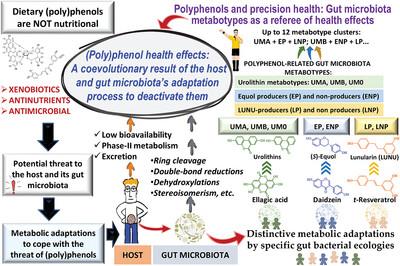当前位置:
X-MOL 学术
›
Mol. Nutr. Food Res.
›
论文详情
Our official English website, www.x-mol.net, welcomes your
feedback! (Note: you will need to create a separate account there.)
Perspective on the Coevolutionary Role of Host and Gut Microbiota in Polyphenol Health Effects: Metabotypes and Precision Health
Molecular Nutrition & Food Research ( IF 4.5 ) Pub Date : 2024-11-13 , DOI: 10.1002/mnfr.202400526 Juan Carlos Espín, María Paula Jarrín-Orozco, Leire Osuna-Galisteo, María Ángeles Ávila-Gálvez, María Romo-Vaquero, María Victoria Selma
Molecular Nutrition & Food Research ( IF 4.5 ) Pub Date : 2024-11-13 , DOI: 10.1002/mnfr.202400526 Juan Carlos Espín, María Paula Jarrín-Orozco, Leire Osuna-Galisteo, María Ángeles Ávila-Gálvez, María Romo-Vaquero, María Victoria Selma

|
“Personalized nutrition” aims to establish nutritional strategies to improve health outcomes for non-responders. However, it is utopian since most people share similar nutritional requirements. “Precision health,” encompassing lifestyles, may be more fitting. Dietary (poly)phenols are “healthy” but non-nutritional molecules (thus, we can live without them). The gut microbiota influences (poly)phenol effects, producing metabolites with different activity than their precursors. Furthermore, producing distinctive metabolites, like urolithins, lunularin, and equol, leads to the term “polyphenol-related gut microbiota metabotypes,” grouping individuals based on a genuine microbial metabolism of ellagic acid, resveratrol, and isoflavones, respectively. Additionally, (poly)phenols exert prebiotic-like effects through their antimicrobial activities, typically reducing microbial diversity and modulating microbiota functionality by impacting its composition and transcriptomics. Since the gut microbiota perceives (poly)phenols as a threat, (poly)phenol effects are mostly a consequence of microbiota adaptation through differential (poly)phenol metabolism (e.g., distinctive reductions, dehydroxylations, etc.). This viewpoint is less prosaic than considering (poly)phenols as essential nutritional players in human health, yet underscores their health significance in a coevolutionary partnership with the gut microbiota. In the perspective on the gut microbiota and (poly)phenols interplay, microbiota metabotypes could arbiter health effects. An innovative aspect is also emphasized: modulating the interacting microbial networks without altering the composition.
中文翻译:

宿主和肠道微生物群在多酚健康影响中的协同进化作用的观点:代谢型和精准健康
“个性化营养”旨在制定营养策略,以改善无反应者的健康状况。然而,这是乌托邦式的,因为大多数人都有相似的营养需求。“精准健康”,包括生活方式,可能更合适。膳食(多)酚是“健康”但非营养分子(因此,我们可以没有它们)。肠道微生物群影响(多)酚作用,产生活性与其前体不同活性的代谢物。此外,产生独特的代谢物,如尿石素、月牙素和马其醇,导致术语“多酚相关肠道微生物群代谢”,分别根据鞣花酸、白藜芦醇和异黄酮的真正微生物代谢对个体进行分组。此外,(多)酚通过其抗菌活性发挥类似益生元的作用,通常通过影响其组成和转录组学来减少微生物多样性并调节微生物群功能。由于肠道微生物群将(多)酚视为威胁,因此(多)酚效应主要是微生物群通过差异(多)酚代谢(例如,独特的还原、脱羟基等)适应的结果。这种观点不如将(多)酚视为人类健康中必不可少的营养参与者那么平淡无奇,但强调了它们在与肠道微生物群的协同进化伙伴关系中的健康意义。从肠道微生物群和(多)酚相互作用的角度来看,微生物群代谢类型可以调节健康影响。还强调了一个创新方面:在不改变成分的情况下调节相互作用的微生物网络。
更新日期:2024-11-13
中文翻译:

宿主和肠道微生物群在多酚健康影响中的协同进化作用的观点:代谢型和精准健康
“个性化营养”旨在制定营养策略,以改善无反应者的健康状况。然而,这是乌托邦式的,因为大多数人都有相似的营养需求。“精准健康”,包括生活方式,可能更合适。膳食(多)酚是“健康”但非营养分子(因此,我们可以没有它们)。肠道微生物群影响(多)酚作用,产生活性与其前体不同活性的代谢物。此外,产生独特的代谢物,如尿石素、月牙素和马其醇,导致术语“多酚相关肠道微生物群代谢”,分别根据鞣花酸、白藜芦醇和异黄酮的真正微生物代谢对个体进行分组。此外,(多)酚通过其抗菌活性发挥类似益生元的作用,通常通过影响其组成和转录组学来减少微生物多样性并调节微生物群功能。由于肠道微生物群将(多)酚视为威胁,因此(多)酚效应主要是微生物群通过差异(多)酚代谢(例如,独特的还原、脱羟基等)适应的结果。这种观点不如将(多)酚视为人类健康中必不可少的营养参与者那么平淡无奇,但强调了它们在与肠道微生物群的协同进化伙伴关系中的健康意义。从肠道微生物群和(多)酚相互作用的角度来看,微生物群代谢类型可以调节健康影响。还强调了一个创新方面:在不改变成分的情况下调节相互作用的微生物网络。






























 京公网安备 11010802027423号
京公网安备 11010802027423号